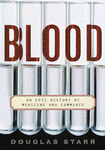


February 25, 1999 (Thursday) at 8:00 p.m.
Recital Hall, Performing Arts Center
University at Albany, Uptown Campus
![]() Craft of Science Writing Seminar, 4:00 p.m., Humanities 290
Craft of Science Writing Seminar, 4:00 p.m., Humanities 290
C-SPAN will air his evening presentation the weekend of March 6-7, 1999. Exact times are unknown although the show is expected to air three times.
![]()
Douglas Starr is the author of Blood: An Epic History of Medicine and Commerce (1998, Alfred A. Knopf, ISBN 0-679-41875-X), which was named by Publisher's Weekly as one of the "Best Nonfiction Books of 1998. Blood is a lively, groundbreaking history of the commercial and medical uses of blood, from the earliest transfusions of calf's blood into madmen during the reign of Louis XIV, to present-day research regarding the manufacture of artificial blood. Starr recounts the establishment of the first blood bank in Chicago in the 1930's, the rapid development of blood technologies during World War II, the derivation of pharmaceuticals from blood, the role of transfused blood in the present AIDS crisis, and the recent growth of a $5 billion for-profit trade in blood plasma.
 Douglas Starr is codirector of the Graduate Program in Science Journalism at Boston University. A former newspaper reporter and field biologist, he has written on the environment, medicine, and science for numerous publications, including Sports Illustrated, Smithsonian and Audobon. Starr also served as a science editor for the PBS series, Bodywatch a health series that ran for three years. He lives near Boston with his wife and their two sons.
Douglas Starr is codirector of the Graduate Program in Science Journalism at Boston University. A former newspaper reporter and field biologist, he has written on the environment, medicine, and science for numerous publications, including Sports Illustrated, Smithsonian and Audobon. Starr also served as a science editor for the PBS series, Bodywatch a health series that ran for three years. He lives near Boston with his wife and their two sons.
". . .a first-class science book. With flair and superb attention to detail, Starr covers blood's flow through the full range of human affairs--medical, economic and political among them." - Publisher's Weekly
"A fascinating history of blood, both as a challenge for scientific understanding and as a product of global business." - Richard Bernstein, The New York Times
"A brightly written, intriguing, and disquieting book, with some important lessons for public health." - Business Week
from the preface. . ."This, then, is the story of blood--the chronicle of a resource, the researchers who have studied it, the businessmen who have traded it, the doctors who have prescribed it, and the lay people whose lives it has so dramatically affected. The book is also a challenge to those who distribute, regulate, and use the resource. Indeed, a lasting tension in its history is how we view this most human of commodities. Is it a gift of charity or simply a pharmaceutical? Can a single resource be both, and if so, what are the safest and most ethical ways to manage it? The answers to such questions will determine the future of this precious, mysterious, and hazardous material." |
Times Union Article
Writers Online Magazine Article
[an error occurred while processing this directive]